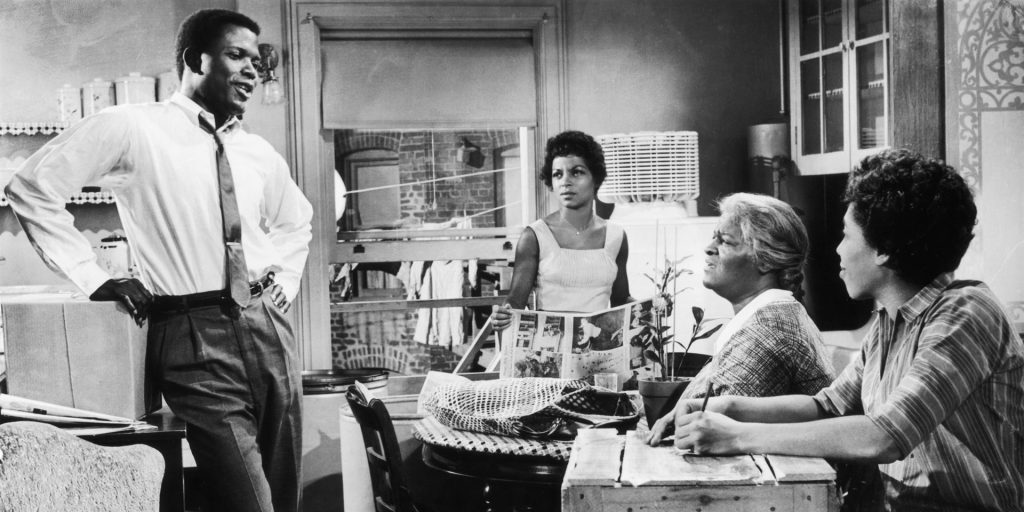By Lucy Syvarth
Ever since we were little, we were told that we should have dreams; dreams about what we want to be when we’re older, dreams about what kind of houses we would want to live in, dreams about what we would want to do with our lives. These dreams kept us excited and hopeful about our futures, and that is why it is so difficult to let go of them sometimes. We have all given up on at least one of our childhood dreams, like becoming an astronaut or a Nascar driver. However, unlike some of us, the members of the Younger family are very determined to hold on to their dreams and fight to make them reality.
Lorraine Hansberry sets the scene and tone of the play in the preface of scene one. Readers are introduced to an apartment that seems small enough to only call it a “room”. She uses a lot of personification in the preface to make it seem as if this room has a personality. For example, Hansbury writes “[the furnishings] have clearly had to accommodate the living of too many people for too many years– and they are tired,” showing that a room that has been lived in long enough can seem to take on human feelings. Hansbury’s use of personification and dreary word choices makes readers sympathize for something not living– a “living” room. Readers can only dream that this room and it’s inhabitants will one day be free of the gloom and decay.
Lorraine Hansberry really does do something very different and interesting in the preface of the first scene. She shows readers the dark and depressing setting of this living room, which sets the tone for the whole play. However, these feelings that are projected onto the readers are subconsciously being turned into hope; hope that the dreams of the characters living in this place will come true.
It is clearly shown within the first act that all of the members of the Younger family have a dream that they want to achieve, all of them being very different. The most evident dream that is introduced is the one of Walter. Almost immediately after waking up, Walter asks Ruth about the check that is supposed to come in on Saturday, even though it is only Friday. Readers can see that money isn’t in abundance and is obviously important to the family considering the apartment that they live in. But Walter doesn’t seem to be worried so much about their living conditions. Walter and Ruth are put into a tense situation when Travis asks for fifty cents, and that is when Walter wants to tell Ruth about what he was thinking about in the bathroom. He reflects on the time that his friend Charlie Atkins wanted Walter to go into the dry-cleaning business with him. He seems envious and bitter while talking about it because Charlie is now “grossing a hundred thousand a year,” (32). This is when readers start to piece together why there was so much tension between him and Ruth when he gave Travis the fifty cents (more on this in a bit). Walter then goes onto tell Ruth about his dream of opening a liquor store, saying, “You see, this little liquor store we got in mind cost seventy-five thousand and we figured the initial investment on the place be ‘bout thirty thousand, see,” (33). Readers may think that Walter’s dream is only to own a liquor store, but it goes deeper than that, considering previous actions.
Walter doesn’t only dream of owning a liquor store. In the bigger picture, Walter dreams of living a life where his family doesn’t have to worry about not having enough money. I came to this conclusion through the close reading of Walter’s dialogue and actions. One of the first things he mentions is the check that is supposed to come in. He seems very on edge, asking Ruth multiple times “What’s the matter with you?” and snapping at her when she tells him to eat his eggs (26). It is obvious that Walter would be a lot more relaxed if there was a check in the mail for him that day. Additionally, Walter’s actions are very different from Ruth’s when Travis asks for fifty cents. Ruth shuts him down immediately, saying “Well, I ain’t got no fifty cents this morning,” and continuing to dismiss him when he brings up the money. However, when Walter hears Ruth telling Travis that they don’t have the money, Walter says, ‘“What you tell the boy things like that for?” (Reaching down into his pants with a rather important gesture) “Here, son,”’ (36). He then continues to give Travis another fifty cents for fruit or a taxicab. Travis is obviously estatic and this pleases Walter. The final example of why Walter’s dream is more than just opening a liquor store is shown when he talks to Ruth about how he sees his life. Walter says “‘I’m thirty-five years old; I been married eleven years and I got a boy who sleeps in the living room’– (very, very quietly)– ‘and all I got to give him is stories about how rich white people live…’” (34). For me, this final quote really confirms the idea that Walter’s real dream is for him and his family to not have to worry about not having enough money.
The Youngers live in a world where they are surrounded by the privileges of white people and how life is much easier for them. Walter doesn’t want his family to live in this kind of world anymore. They always see how much more money white people have and all the things that they can do with their money that the Youngers can’t. Walter wants to open his own liquor store so he can have a shot at making a lot of money so he and his family can live comfortably and not have to be envious of people who do have money. Walter doesn’t want to tell Travis stories about “how rich white people live” anymore. Walter wants to tell him stories about how he had a dream and made it a reality.
Discussion Questions:
-Who’s dream can you relate to the most in Act I and why?
-Why do you think that it is important to have dreams and goals, and why do you think Hansberry focuses on them so much?







I completely agree with you that Walter has a long term goal and that is to get his family out of their current situation and not have to worry about money anymore. I also liked how you focused on his relationship with Travis because I think he (Travis) is the biggest reason Walter is trying so hard for everything. After unsuccessfully arguing for his liquor store proposal, he angrily tells Mama “Well, you tell that to my boy tonight when you put him to sleep on the living-room couch…” (71). He wants the best for his only child (only child as of now) and it’s clear that Mama not listening to his proposal hurt him deeply inside.
Life has always been about finding dreams and achieving goals. This becomes a huge problem when there are obstacles that are put in the way. There are also people competing against you for that same dream. Walter is someone who stands by this claim by stating “Man say to his woman: I got a dream. His woman say: Eat your eggs” (Act I Scene I). Walter is placing men and woman against each other and when Walter says this, he is referring to Ruth and her lack of drive in what she does. Life is all about achieving goals, but there is going to be obstacles along the way. It is all about getting past them and moving forward.
I like the pattern that you brought up about how every single character in the story so far has a dream or a goal ahead of them. I agree with you about how these goals can cause tension between Ruth and Walter, because Walter is trying to be proactive about his goal while Ruth is trying to be reasonable about the risks and be cautious. I believe that Hansberry focuses so much on goals because the story itself seems to circulate around the obstacles that we face when trying to achieve these goals- especially when it comes to socioeconomic status. Another example of this in A Raisin in the Sun would be when Walter clear states that he “wants so many things that they are driving [him] crazy”(73) because all he wants is for things to be better for his family, but there is too much in the way for this dream to come true.
I like how you explained how each character has their own dream that they want to achieve in their life. Each of the characters dreams involves money in some type of way in Act 1 alone each character in the Younger household mentions money in one way or another. I agree with you that Walter wants more than just the liquor, store he just wants to his family to never have to worry about bills and where to sleep and fifty cents for a cab or school. On page thirty he says “he’s grossing a hundred thousand a year. A hundred thousand dollars a year.” This shows that Walter wants one larger dream of being well off, but has several smaller dreams such as these businesses or investments.
I agree with you in that the Younger family does want to hold onto their dreams. Throughout the first act it is clear that the Beneatha has those dreams of becoming a doctor. In the first act and scene Beneatha sarcastically apologizes to her brother Walter for having those dreams, “BENEATHA (Dropping to her knees) Well – I do – all right? – thank everybody! And forgive me forever wanting to be anything at all! (Pursuing him on her knees across the floor) FORGIVE ME, FORGIVE ME, FORGIVE ME! (1.1.38). I think Hansberry focuses on them so much is because even though the family is going through these hard times it shows how important it is to have a dream and goal. The dreams and goals can help someone push through the hard times.
I agree with you when you say that Walter’s dream is bigger than just owning a business, he wants to be able to make it so his family never had to worry about money. I feel like Hansberry focuses on dreams so much because she wants to show that even thought the Young family Isn’t that well off, they are trying to push through and they still have hopes and dreams that they aspire to reach .
I really like how you went deep into the idea that there was an underlying dream in Walter’s dream of just the liquor store. The idea that Hansberry displays of Walter wanting to be able to support his family without having to worry about money shows not only the struggle the Younger family is going through to try to live this way, but also shows Walter’s perseverance through his family talking him down in order to try and make this dream happen for them. In Act 1, Walter says to Ruth, “You tired, ain’t you? Tired of everything. Me, the boy, the way we live…You couldn’t be on my side that long for nothing, could you?”(32). I feel Hansberry focuses so much on Walter’s dreams and underlying dreams to show that no matter how many times his family puts him down about it that he is going to try and make that dream happen for them anyway, which shows that perseverance that is relevant throughout the play.
I thought it was interesting that you focused on Walter’s dream because out of all the characters in the play, Walter’s dream seems the most ambitious. Even though the family is short on money, Walter gives Travis $1 to go spend while at school. I can relate with Walter’s dream the most because he gives Travis this sense of reality that they have money to spend and doesn’t want to see his son worrying about the money too because Travis was also asking when the check was coming in. It is important to have dreams and goals because it is something you have to work hard for to reach. Hansberry focuses on these dreams, mostly in act 1, to create tension between the family members as each one of them has a different idea of what they are going to do with the $10,000 check.
I really liked how you went into the theme of dreams, and took it all the way back to mentioning how as children, we all have dreams, but not many of them stick with us as we grow up. I think that you really tried to give us an emotional connection to these characters and a way to empathize with their current situation. I also thought that maybe it could’ve been an unintentional foreshadow, that maybe somehow throughout later in the play, some of the family members’ dreams will shift and change, as they are exposed more to the real world. I think having dreams and goals are so important to have for not only yourself in life, but for others too, because even if you may not realize your dream may just inspire someone else to have a similar dream or change their life, too. Dreams are powerful because they give you something to want and fight for in life, and I think that’s why Hansbury focuses on them so much, and makes Walter’s dream so real and prominent to the audience.
I like how you start off by saying something that everyone can relate too. Talking about the long forgotten dreams of our childhood that seem silly and impossible now. It is very important to have dreams/goals because they give people motivation, they give people something to look forward too. The younger family it seems only talks about their dreams because dreams can be an escape from reality and we all need an escape every now and again.
I like that you recognized how each character has a goal/dream no matter what it is, they each are striving to achieve something to better their lives. I agree when you say Walters dream is bigger than just owning an alcohol store. He wants the opportunity to create a business and make enough money to support his family and not have to struggle. I feel like this book is so goal and dream oriented to show that even people like the Young family, who have very little and scrape by, they still are ambitious and want to make their dreams into a reality.